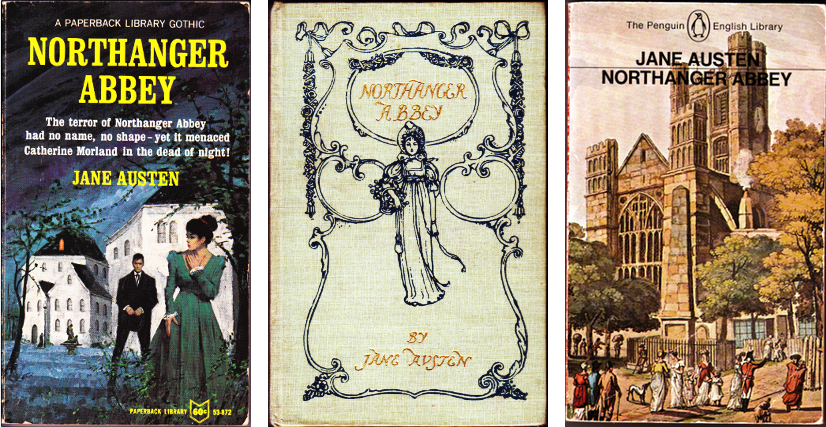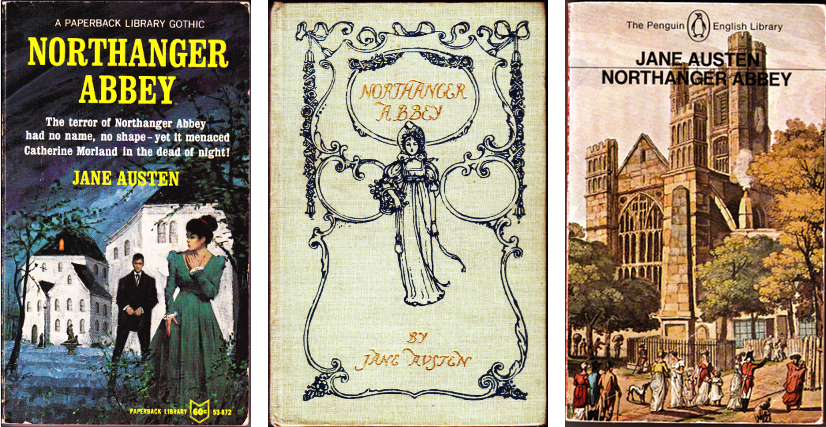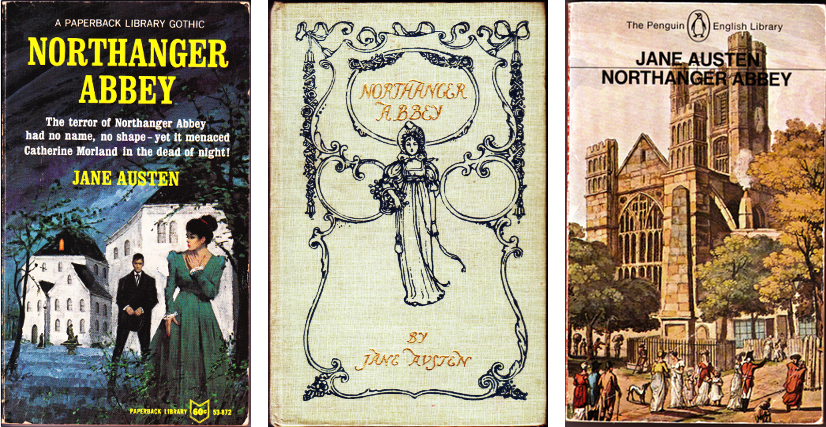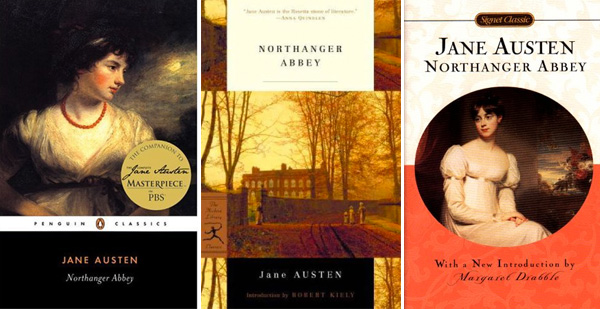IN TRAINING FOR A HEROINE: THE GREAT NORTHANGER ABBEY RE-READ, PART VI
Covers from Jane Austen to Cover
We’re here! We’ve finally made it! There are still so many unanswered questions, so many unrequited feelings, but we’re at the end, and it will all come together, I promise. Will you be satisfied with Northanger Abbey’s outcome? Will our dear Catherine Morland get everything she deserves? Read on to find out, and check out last week's in case you missed it!
Chapter 26
Catherine, Henry, and Eleanor keep going over the Isabella fiasco for the next few days (you know, the one when she left her fiancé, Catherine’s brother, and did god knows what with the eldest Tilney brother in the hopes of marrying better). The siblings’ insistence that Isabella’s lack of fortune and “consequence” will hinder her marriage to Captain Tilney begins troubling Catherine. Though General Tilney has always been courteous toward Catherine and professed himself uncaring of riches (pffffhahaha yeah. Okay.) Catherine begins to realize that her own lack of wealth may pose a problem for the feelings she’s been developing for Henry.
Regardless, Henry must go back to Woodston (where he is a clergyman) in a few days. He’ll be gone for a little while, and General Tilney announces that they will all go visit him. Henry is not to trouble himself, they’ll just pop in whenever and dine on whatever he has kicking around. Except that Wednesday would be best, he can expect them at quarter to one, but really anything’s fine. Henry summarily leaves that day to prepare everything for the dinner (he’s clearly familiar with his father’s insane standards), leaving Catherine rather bereft.
Finally (finally!) it is Wednesday, and they leave for Woodston. Catherine thinks it’s perfect. She’s too shy to show how much she likes it though, and is made more uncomfortable by General Tilney’s constant apologizing for everything (the village, the house, the size, the location, the list goes on). Catherine is totally smitten with everything about Henry’s home, though. I mean, when they show up he is literally surrounded by puppies, so dude clearly knows how to win a gal’s heart. In an unguarded moment Catherine mentions loving a particular room, and how if this were her house she’d always sit in it. She’s embarrassed by her candor, but it puts General Tilney in exceedingly high spirits all the way home.
Chapter 27
There’s been a letter from Isabella! It’s about damn time. I can’t even with this girl, I’m done with her. Can I just skip ahead? No, I guess I wouldn’t do that to you. The letter itself is all idle prattle about the weather, the fashions, the awful young men—and one in particular—to be found in Bath. She misses Catherine so very much and hasn’t heard from dear, sweet James in so long! Maybe he’s displeased with her, though she has no idea why he might be. Could Catherine maybe figure it out? Set things right between them? That would be great, thanks so much. Hugs and kisses!
Ugghhh.
“Such a strain of shallow artifice could not impose even upon Catherine.” Too right it couldn’t. Isabella always underestimated Catherine, mistaking her trusting nature for stupidity, and it’s really come back to bite her now. Catherine vows to leave the letter unanswered, and to never mention Isabella to James, to protect him from future machinations. What our dear little protagonist can’t figure out, however, is why Captain Tilney would lead Isabella on if he had no real feelings for her. Both Henry and the reader know that it’s really not that complicated (hint: he wanted a closer look at Isabella’s petticoats, if you know what I’m saying) but Henry gently steers her away from that line of inquiry, knowing, perhaps, that she’s still very young and will have plenty of time later for that sort of sordid business.
Chapter 28
General Tilney must leave for London, and it’s as if a cloud has been lifted from Northanger. Catherine is having a grand old time with the two Tilneys, but begins to worry that she might be overstaying her welcome. A conversation with Eleanor quickly puts that fear to rest: the other young woman has been enjoying the company and would love to have her stay for several more weeks.
Eventually, Henry must leave again for Woodston, and Eleanor and Catherine are alone in the house. One evening, there’s a loud noise in the entry hall, and Catherine assumes it must be Captain Tilney coming back home. Eleanor comes to find her, pale, shaken, and clearly very upset, and informs her that her father is back and that Catherine needs to leave. Early in the morning. Without a servant, or even a carriage for most of the trip. Eleanor talks about a visit to friends they’d forgotten, and how the whole family must leave soon, but it doesn’t explain the suddenness with which Catherine has been dismissed. Our heroine is rightfully upset and confused, having no idea what she did that would anger the General.
In the morning, Eleanor gives her some money for the trip (thankfully, since Catherine had none of her own), and asks her to write a letter once she’s home safely, but to address it to “Alice.” Catherine replies that she’d better not write if it’s forbidden, and Eleanor, still mortified at what she’s putting her friend through, doesn’t insist. Catherine leaves Northanger Abbey, heartbroken.
Chapter 29
Catherine makes the journey home safely, getting help with directions and tipping well along the way. She handles the situation admirably, and is quite honestly too sad to be afraid. She tries very hard to figure out why she’s been treated so poorly, after all the kindness she received at Northanger, but comes up empty handed.
Back home, Catherine’s family welcomes her, and they’re just the sort of good-natured, uncomplicated people you’d expect. They’re all categorically on her side—General Tilney’s behaviour was scandalously bad mannered—but aren’t going to waste a whole lot of time on his potential motives. Catherine’s home safe, and that’s all they’re concerned about. (They react similarly to James’s dissolved engagement: They’re sorry for him, but there’s no long-term harm done.) The Allens as well are indignant on Catherine’s behalf, but this doesn’t do much to cure her of her heartache. She’s a little preoccupied thinking about Henry.
Chapter 30
Catherine can’t sit still, keep her mind on any one task, or even really pay attention to anything. Homegirl is heartbroken, and nothing’s going to help (especially not her mother who just thinks she’s been spoiled by rich friends and needs to get her priorities straight) (thanks, mom). But hold the phone, who’s come to visit but one Mr. Henry Tilney!
Our leading man says that though he has no right to expect a warm welcome after the way his family has treated Catherine, he wanted to apologize for his father and make sure Catherine had reached home safely. He makes small talk with Catherine’s mother who, thankfully, notices her daughter’s happiness and agitation and suggests that the two of them pay a visit to the Allens. Smart lady, that Mrs. Morland. The two talk on their way, and Henry tells Catherine of his affection for her. Ah! Finally!
Catherine also learns that General Tilney only kicked her out of the house because he found out she wasn’t as rich as he’d supposed. John Thorpe (remember him? Remember how much we hated him?) had originally mentioned that she was to inherit the childless Allens’ fortune, which was absolutely not true. The General believed him though, and had wanted her for a daughter-in-law. When a jilted John later ran into the General in London, he lost no time disillusioning the other gentleman. After conveniently getting rid of poor Catherine, General Tilney ordered his son to stop thinking of her. They fought dreadfully, and Henry took off to go find Catherine. This is what great, dramatic love looks like, folks.
Chapter 31
Wrap up time! Catherine’s parents are surprised that Henry is asking them for permission to marry their daughter, but “nothing, after all, could be more natural than Catherine’s being beloved,” so in the end they’re cool with it. They do, however, want General Tilney to consent as well, before they can let the marriage proceed. Our two lovebirds are thus unfortunately, cruelly separated (though there may have been clandestine letters sent back and forth).
Eleanor, for her part, gets a nice little off-screen happy ending. We learn that she had long been partial to a young man of whom her father would not approve, but that that young man had recently come into both money and a title. With nothing further stopping them, the two were married, and General Tilney’s joy is so great (he gets to call his daughter “your ladyship” and this is a Big Deal) that she manages to get him to forgive Henry. The youngest son is permitted to return to Northanger, Catherine and Henry are wed, and everyone smiles. The end!
Commentary
And so, in true Austen fashion, there’s love, a wedding, and all loose ends are neatly wrapped up and tied with a bow (a fashionable bow, with silk ribbon, probably from London). Though these last few chapters seem a little rushed, especially compared to earlier in the novel when each Bath interaction was recounted at length, I’m always so happy for Catherine and Henry. They’re just so unbearably cute. (And also, it bears mentioning, fairly young compared to Austen’s other couples. She makes a point of telling us they’re only eighteen and twenty-six by the time they marry.)
I’m also partial to their romance because it’s almost brutally realistic. Austen makes no bones about it: Henry only paid attention to Catherine because he could tell she was interested, it’s only afterward that he learned to value and care for her on her own merits. Though there’s something so beautiful about the idea of mutual, bone-shaking love at first sight, this seems more true to life. Feelings develop slowly, unequally, and though it’s maybe not so dignified, seeing that dynamic play out in this novel makes the romance all the more meaningful.
Hopefully they’ll be happy together. Austen certainly thinks they will, pointing out that the General’s interference allowed them both to take the time to really get to know each other as potential spouses. And though it’s easy to get swept up in the moment, it’s important to remember that Catherine’s happiness now fully depends on Henry. Though throughout the novel we constantly see men moving in and out of the domestic sphere, the women must stay wholly confined within it. That lack of mobility gives quite a lot of insight into Eleanor’s character, something I touched on last week, and also puts into sharp focus how utterly dependent women were on the benevolence of the men around them.
Though the General’s constant undermining of Eleanor is toxic, Catherine’s treatment is far less subtle. It takes really not that much for our heroine to be kicked to the curb, without even the money to get home safely. Can you imagine what would have happened if Eleanor hadn’t had some savings stashed away? Despite how easy it is to focus on Northanger Abbey’s gowns and balls and grand gestures of love, the lack of power wielded by women is consistently terrifying to me. There’s more horror there than in any story concocted by Catherine’s novel-addled mind.
Eleanor is, thankfully, able to escape the confines of Northanger. Austen is keenly aware of how crucial this was for the character, even employing the rarely-seen first person to tell the reader that her “own joy on the occasion is very sincere. I know no one more entitled, by unpretending merit, or better prepared by habitual suffering, to receive and enjoy felicity.”
And so here we are, at the end of the book. It’s been a long journey, and there’s a lot more digging that could be done. Austen’s literary references alone could have made up several of their own blog posts. But I think I’ll end these recaps, like all of the great authoress’s novels, with love. I love Northanger Abbey, and I hope that you, you who have been following along so faithfully, love it to.




